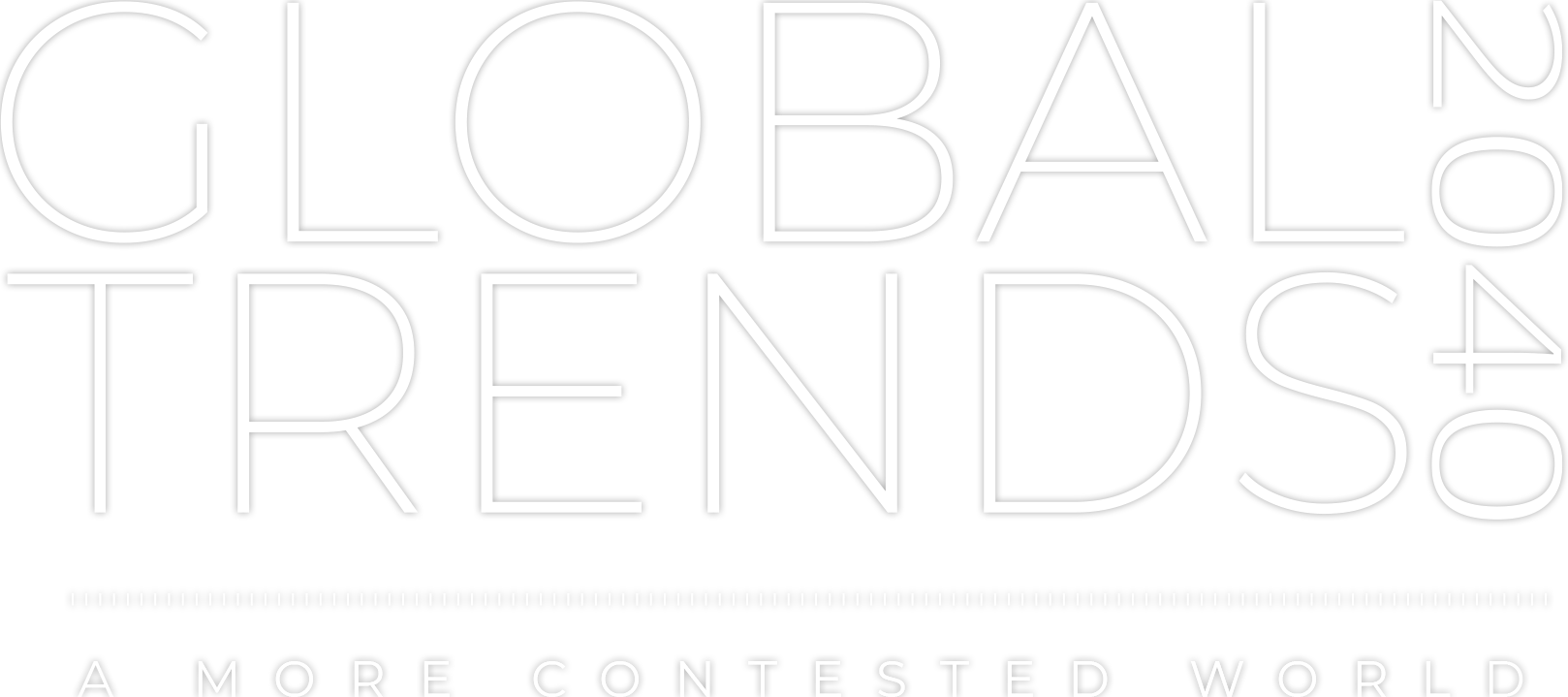THE COVID-19 FACTOR: EXPANDING UNCERTAINTY 
The COVID-19 pandemic emerged globally in 2020, wreaking havoc across the world, killing more than 2.5 million people as of early 2021, devastating families and communities, and disrupting economies and political dynamics within and between countries. Previous Global Trends editions forecasted the potential for new diseases and even imagined scenarios with a pandemic, but we lacked a full picture of the breadth and depth of its disruptive potential. COVID-19 has shaken long-held assumptions about resilience and adaptation and created new uncertainties about the economy, governance, geopolitics, and technology.
To understand and assess the impact of this crisis, we examined and debated a broad range of our assumptions and assessments related to key global trends. We asked a series of questions: Which existing trends will endure, which trends are accelerating or decelerating because of the pandemic, and where are we likely to experience fundamental, systemic shifts? Are the disruptions temporary or could the pandemic unleash new forces to shape the future? Much like the terrorist attacks of 11 September 2001, the COVID-19 pandemic is likely to produce some changes that will be felt for years to come and change the way we live, work, and govern domestically and internationally. How great these will be, however, is very much in question.
ACCELERATING, SHARPENING SOME TRENDS
The pandemic and corresponding national responses appear to be honing and accelerating several trends that were already underway before the outbreak. COVID-19 brought global health and healthcare issues into sharp relief, exposed and in some cases widened social fissures, underscored vast disparities in healthcare access and infrastructure, and interrupted efforts to combat other diseases. The pandemic also highlighted weaknesses in the international coordination on health crises and the mismatch between existing institutions, funding levels, and future health challenges.
Catalyzing Economic Trends. Lockdowns, quarantines, and the closing of international borders have catalyzed some preexisting economic trends, including diversification in global supply chains, increased national debt, and greater government intervention in economies. Moving forward, the character of globalization may retain some of the changes from this crisis period, and debt, particularly for developing economies, will strain national capacities for many years.
Reinforcing Nationalism and Polarization. Nationalism and polarization have been on the rise in many countries, especially exclusionary nationalism. Efforts to contain and manage the virus have reinforced nationalist trends globally as some states turned inward to protect their citizens and sometimes cast blame on marginalized groups. The response to the pandemic has fueled partisanship and polarization in many countries as groups argue over the best way to respond and seek scapegoats to blame for spreading the virus and for slow responses.
Deepening Inequality. The disproportionate economic impact of COVID-19 on low-income earners has caused them to fall further behind. When COVID-19 is finally controlled, many families are likely to have experienced further setbacks, especially those working in the service or informal sectors or who left the workforce to provide dependent care—predominantly women. The pandemic has exposed the digital divide within and between countries while spurring efforts to improve Internet access.
Straining Governance. The pandemic is straining government capacity for services and contributing to already low levels of trust in institutions in countries that have not effectively handled the response. The pandemic is exacerbating the confusing and polarized information environment that is undermining public confidence in health authorities, particularly in open societies. Illiberal regimes in some countries are using the pandemic as a pretext to more severely crack down on dissent and restrict civic freedoms, conditions that may outlive the disease.
Highlighting Failed International Cooperation. The COVID-19 pandemic exposed the weaknesses and political cleavages in international institutions, such as the World Health Organization (WHO) and United Nations, and called into question countries’ ability and willingness to cooperate multilaterally to address common challenges beyond infectious disease, particularly climate change. The WHO, which has faced significant funding difficulties and resistance to mandatory surveillance regimes, is facing its gravest shock in nearly two decades. The crisis, however, may ultimately lead actors to make deeper reforms, standardize data collection and sharing, and forge new public-private partnerships.
Elevating the Role of Nonstate Actors. Nonstate actors, ranging from the Gates Foundation to private companies, have been crucial to vaccine research or retrofitting equipment to mass produce medical supplies and personal protective equipment. Nonstate networks will complement national and intergovernmental action in future health crises, including early warning, treatment, facilitation of data-sharing, and vaccine development.
WHILE OTHERS DECELERATE OR REVERSE
COVID-19 is slowing and possibly reversing some longstanding trends in human development, especially the reduction of poverty and disease and closing gender inequality gaps. The longest lasting reversals may be in poverty reduction across Africa, Latin America, and South Asia, followed by losses in gender equality. The resources devoted to fighting COVID-19 and social restrictions could reverse years of progress against malaria, measles, polio, and other infectious diseases by consuming key financial, material, and personnel resources.
The COVID-19 emergency may bring regions together in ways that previous crises have not. Although European countries early in the crisis imposed restrictions on border traffic and exports of critical medical supplies, the European Union has rallied around an economic rescue package and other emergency measures that could bolster the European integration project going forward. COVID-19 could also lead to redirection of national budgets toward pandemic response and economic recovery, diverting funds from defense expenditures, foreign aid, and infrastructure programs in some countries, at least in the near term.
MORE QUESTIONS THAN ANSWERS
The unanticipated second- and third-order effects of the COVID-19 pandemic have reminded us how uncertain the future is—both in the long and short term. As researchers and analysts, we must be ever vigilant, asking better questions, frequently challenging our assumptions, checking our biases, and looking for weak signals of change. We need to expect the unexpected and apply the lessons of this pandemic to our craft in the future.


